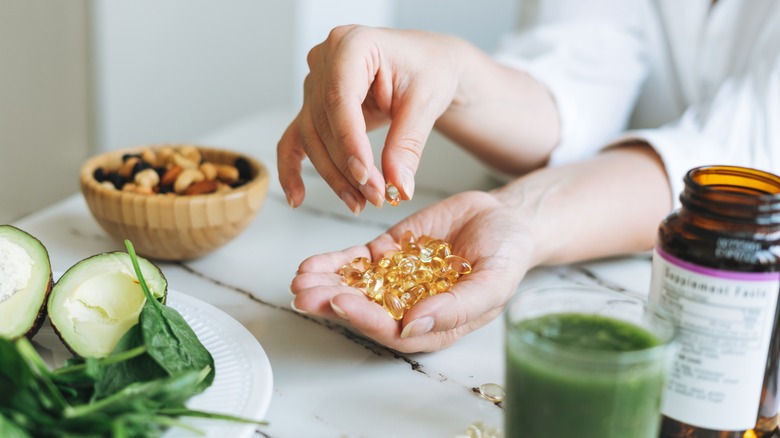The Vitamins You Should Be Taking In Your 80s
For children, it's widely known that calcium and vitamin D are the 'optimal pairing' to be taken at their age (per The Healthy). However, as one ages, the list of daily vitamins to take seems to grow profusely, with some dropping off and new supplements being added. Consequently, the list of ideal vitamins changes at every age, but in your 80s, which vitamins are actually helpful?
According to Dr. Donald B. McCormick, the professor emeritus of biochemistry and the graduate program in nutrition and health sciences at Emory University, in an interview with WebMD, "A lot of money is wasted in providing unnecessary supplements to millions of people who don't need them." This particularly rings true in the older adult population, as supplementation is often assumed to be a cure for aging, states WebMD. It's important to note that the role of vitamins is not to stop the aging process.
Medical News Today defines vitamins as organic compounds that our bodies need. We get most vitamins from food and supplements. Among older adults, vitamins that are often lacking include calcium, potassium, and vitamin D (via WebMD).
How to incorporate vitamins naturally
It's increasingly important to include vitamin B12, as stated in a 2016 review from the Current Opinion in Clinical Nutrition & Metabolic Care, which found older adults to be more susceptible to a deficiency. Absorption of this vitamin becomes less effective during the aging process.
Nevertheless, McCormick points out via WebMD, "If you are still eating fairly well, you are getting more micronutrients than you probably really need to function as well as you can." Thus, one option to attain more vitamins can be through a balanced diet that suits your needs.
If you're needing more calcium, opt for calcium-rich foods such as yogurt, milk or milk alternatives, leafy greens, broccoli, tofu or dried beans (per Cleveland Clinic). Similarly, according to Healthline, vitamin B12 can be found in sardines, beef, fortified nutritional yeast, salmon, fortified milk, and yogurt. For potassium, the Harvard School of Public Health suggests eating bananas, avocados, lentils, almonds, and dried fruits.


